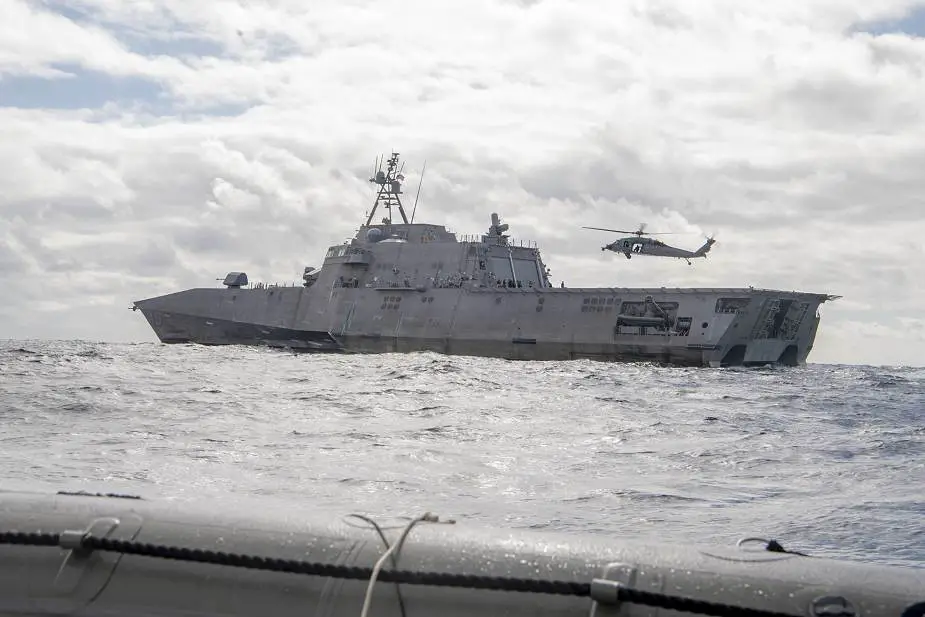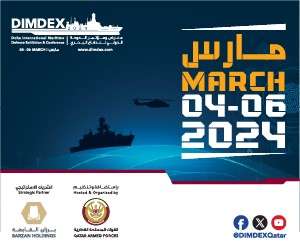According to news published by the U.S. Navy on November 4, 2020, the U.S. Navy Independence Class Littoral Combat Ship USS Gabrielle Giffords (LCS 10) is conducting enhanced counter-narcotics operations in the U.S. 4th Fleet area of operations (AOO), and has seen great success since arriving on station in October.
Follow Navy Recognition on Google News at this link
 The Independence Class Littoral Combat Ship USS Gabrielle Giffords (LCS 10) is conducting enhanced counter-narcotics operations in the U.S. 4th Fleet area of operations. (Picture source U.S. Navy)
The Independence Class Littoral Combat Ship USS Gabrielle Giffords (LCS 10) is conducting enhanced counter-narcotics operations in the U.S. 4th Fleet area of operations. (Picture source U.S. Navy)
The U.S. Navy USS Gabrielle Giffords (LCS 10) is conducting enhanced counter-narcotics operations in the U.S. 4th Fleet area of operations (AOO), and has seen great success since arriving on station in October. The ship has proven to be an invaluable asset through strengthening partnerships while also improving interoperability with U.S. forces in the region.
Gabrielle Giffords recently completed a routine Planned Maintenance Availability (PMAV) executed by 24 Sailors from the Maintenance Execution Team (MET) deployed onboard the USNS Burlington (T-EPF 10), an afloat staging base deployed as a testbed to support new concepts for expeditionary LCS maintenance and support. Several concepts show promise.
The USS Gabrielle Giffords (LCS-10) is an Independence-class littoral combat ship in service with the United States Navy. Construction on Gabrielle Giffords began with her keel laying on 16 April 2014, at the Austal USA shipyard in Mobile, Alabama. The ship was delivered to the U.S. Navy on 23 December 2016 and commissioned the following spring on 10 June 2017, in Galveston, Texas.
The littoral combat ship (LCS) is a set of two classes of relatively small surface vessels designed for operations near shore by the United States Navy. The Freedom class and the Independence class are the first two LCS variants. The Independence variant is an aluminum trimaran design originally built by an industry team led by General Dynamics Bath Iron Works for LCS 2 and LCS 4. Currently, Independence variant LCS (LCS 6 and subsequent even-numbered hulls) are constructed by Austal USA in the company's Mobile, Alabama, shipyard.
The USS Gabrielle Giffords is armed with one BAE Systems Mk 110 57 mm gun, four .50 cal (12.7 mm) guns, one SeaRAM 11-cell missile launcher, eight RGM-184A Naval Strike Missiles and two Mk44 Bushmaster II 30mm automatic cannons.
To date, Gabrielle Giffords with an embarked U.S. Coast Guard (USCG) Law Enforcement Detachment (LEDET) team has seized over 2,200 of suspected cocaine worth an estimated wholesale value of $83.2 million dollars supporting enhanced counter-narcotics operations.
Additionally, Gabrielle Giffords conducted at-sea replenishment with a partner nation oiler, and a cooperative deployment with five ships from the Salvadoran Navy in the Eastern Pacific Ocean. Their operations enhanced maritime domain awareness and warfighting partnership.
Gabrielle Giffords also worked with the "Winged Warriors" of 1st Battalion, 228th Aviation Regiment (1-228 AVN) to complete MH-60L Black Hawk flight deck landing qualifications in support of Joint Task Force-Bravo’s mission, ready to support humanitarian and civic assistance, counterdrug, contingency and disaster relief operations in Central America.
Both Gabrielle Giffords and Burlington will participate in the upcoming UNITAS LXI exercise hosted by Ecuador, the longest-running multinational maritime exercise in the world, building and exercising regional maritime readiness. UNITAS brings together like-minded nations to hone warfighting skills and ensure readiness to quickly assemble an effective team in a crisis.
On April 1, U.S. Southern Command began enhanced counter-narcotics operations in the Western Hemisphere to disrupt the flow of drugs in support of presidential national security objectives. Numerous U.S. agencies from the Departments of Defense, Justice and Homeland Security cooperated in the effort to combat transnational organized crime.
The Coast Guard, U.S. Navy, Customs and Border Protection, FBI, Drug Enforcement Administration, and Immigration and Customs Enforcement, along with allied and international partner agencies, play a role in counter-drug operations.
U.S. Naval Forces Southern Command/U.S. 4th Fleet supports U.S. Southern Command’s joint and combined military operations by employing maritime forces in cooperative maritime security operations to maintain access, enhance interoperability, and build enduring partnerships in order to enhance regional security and promote peace, stability and prosperity in the region that includes the Caribbean, Central America and South America.



